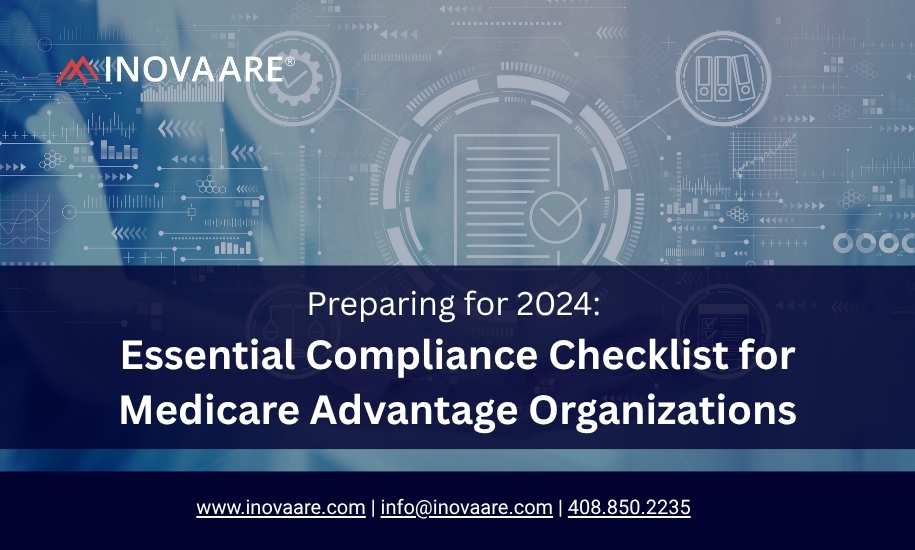The Annual Election Period (AEP) has ended. Before the Medicare Advantage Open Enrollment Period (MA OEP)[1] begins on January 1, 2024, Medicare Advantage Organizations (MAOs) still have time to review if they are completely ready for a new contract year.
The Contract Year (CY) 2024 Readiness Compliance Checklist for Medicare Advantage Organizations, Prescription Drug Plan Sponsors, 1876 Cost Plans, and Medicare-Medicaid Plans released by the Centers for Medicare & Medicaid Services (CMS) on October 13, 2023, is an excellent place to start. This HIPAA Compliance Checklist is published and updated annually as a tool for organizations to prepare for the upcoming year.
This blog article focuses on some of the “must make” changes to take effect as of January 1, 2024, or before.
Acumen, a CMS contractor, releases an Inflation Reduction Act (IRA) Cost Sharing Maximum Report for Part D plans monthly via its Prescription Drug Event (PDE) Analysis web portal. These reports are designed to assist Part D plans with identifying and correcting the benefit year 2023 PDEs that may be misreporting the cost-sharing maximum for Part D covered insulins and ACIP-recommended adult vaccines. Reporting of the latter began in December 2023[2].
CMS is notifying drug plans with informational edit 902 in PDE that “If an NDC is an ACIP-recommended vaccine, DOS[3] is on or after 1/1/2023, the Patient Pay Amount must equal zero.” Upon receipt of this notification, MAOs are expected to research the PDE records in the IRA Cost Sharing Maximum Reports to determine the appropriate action that must be taken to address the issue, including corrective action and submitting a response for each “ticket” in the Acumen PDE Analysis report. Part D plans must submit adjustments and deletions within 90 days of PDE rejection[4] after discovering an issue requiring change.
If PDE records are submitted for covered insulin and ACIP-recommended Part D adult vaccines in 2023, Part D plans must submit a supplemental file within 6 months of the end of a coverage year to allow CMS to determine the total IRA Subsidy Amount (IRASA) to be paid to the Part D sponsor.[5]
The IRA eliminates beneficiary cost-sharing in the catastrophic phase. Part D plans must be prepared to correctly adjudicate this change to the Part D benefit. Beginning January 1, 2024, when a beneficiary’s out-of-pocket spending reaches $8,000 (including certain payments made by other people or entities, including Medicare’s Extra Help program, on your behalf), the beneficiary’s copay for covered Part D drugs will be zero for the rest of the calendar year. Some beneficiaries may reach the catastrophic threshold with out-of-pocket spending for one drug as early as January 2024.
All Special Needs Plans (SNPs) must include one or more questions in their Health Risk Assessment (HRA) in the following areas: housing stability, food security, and access to transportation. SNPs must select questions from a list of screening instruments specified by CMS.[6]
Unlike physical health services, emergency behavioral health services must not be subject to prior authorization. MAOs must notify enrollees when the enrollee’s behavioral health or primary care provider(s) are dropped midyear from networks, and MAOs must establish care coordination programs, including coordination of community, social, and behavioral health services, to help move towards parity between behavioral health and physical health services and advance whole-person care.
To determine services covered under Parts A and B, MAOs must comply with national coverage determinations (NCD), local coverage determinations (LCD), and general coverage and benefit conditions included in Traditional Medicare regulations. When coverage criteria are not fully established, MAOs may apply internal coverage criteria to medical necessity decisions. The requirements should be based on current evidence in widely used treatment guidelines or clinical literature and made publicly available to CMS, enrollees, and providers.
Beginning January 1, 2024, an MAO may not use any utilization management policies for basic or supplemental benefits unless those policies and procedures have been reviewed and approved by the Utilization Management (UM) Committee, which must meet all the requirements established at § 422.137, including requirements for committee composition and responsibility,[7] such as reviewing policies annually and ensuring consistency with Traditional Medicare’s NCD and LCD guidelines.
Like Part D transition rules, coordinated care plans must provide a minimum 90-day transition period when an enrollee currently undergoing treatment switches to a new MA plan, during which the new MA plan may not require prior authorization for the active course of treatment. (Source: 2024 Medicare Advantage and Part D Final Rule_CMS-4201-F)
The HIPAA compliance checklist entails that MAOs must provide services in a culturally competent manner to:
- people with limited English proficiency or reading skills.
- ethnic, cultural, racial, or religious minorities.
- the disabled.
- people who identify as lesbian, gay, bisexual, or other diverse sexual orientations,
- people who identify as transgender, nonbinary, and other diverse gender identities, or people who were born intersex.
- residents in rural areas and other areas with high levels of deprivation; and
- otherwise adversely affected by persistent poverty or inequality. This requirement is consistent with CMS’ efforts to promote health equity.
Call us at 1.408.850.2235 or Contact us to leverage Inovaare’s expertise in data validation, utilization management, care coordination, and, most importantly, Medicare compliance and SME consulting services to review and validate the implementation of the above and other requirements in the new contract year.
[1] MA OEP allows enrollees already in a Medicare Advantage plan to switch to another Medicare Advantage Plan with or without drug coverage, drop the existing Medicare Advantage Plan, go back to Original Medicare, or join a Medicare drug plan. Chapter 2 – Medicare Advantage Enrollment and Disenrollment, August 15, 2023
[2] Updates to the Inflation Reduction Act (IRA) Cost Sharing Maximum Reports for Part D Sponsors, December 1, 2023
[3] DOS=date of service
[4] An information edit is not a rejection; however, CMS expects Part D plans to address the issue upon notification by Acumen.
[5] 2024 Part C & D MMP Readiness Checklist
[6] Section 90 Chapter 16-B of the Medicare Managed Care Manual
